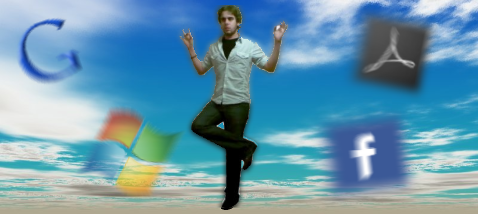Live blog results: students cannot live entirely in the cloud

I've lived in the cloud for two days solid, and it's not as easy as I thought it would be. I traded in my applications for web alternatives - such as MSN Web Messenger, Google Docs, Acrobat.com and Windows Live Mail.
Although it's been useful getting to know the online applications, it should never be a substitute for offline applications where possible. Google Docs is good, great in fact, and I've been really pleased with what it can offer me, but Word 2007 just has that much needed leverage you need when dealing with complicated documents.
I enjoyed using Google Docs for reading presentations, but not so great for editing with. I think it's fair to say, the cloud applications are great as a technological middle-man; using it to make quick edits, holding online in storage for local printing and uploading a few notes for later editing.
Both Acrobat.com and Google Docs support all major filetypes - .ppt, .doc., .pdf, .xls and even the newer XML based filetypes. But the standards just aren't up to scratch yet. You can't import or export files exactly as they were, which means you end up spending time editing the documents before you print.
And roll on Windows Live Web Messenger, once it's finally released, because the main alternative to the downloadable Windows Live Messenger is the MSN Web Messenger. It's horrendously outdated, slow, and doesn't perform half as well as the next Live-branded version will be.
Software+Services functionality was essential to my cloud survival; having an offline application which worked in conjunction with the cloud, such as Live Mesh. There were times when I needed Live Mesh to listen to music files and keep my university files available from anywhere. The big advantage was mobile access through my phone, which meant I could download, work on them, then upload again. Strictly speaking, you could call that offline working, but I didn't want to count it, personally.
There's little provision for fun when you're working in the cloud. There's little to do in terms of games and suchlike, except Facebook, which even then after a while, it got a little boring.
There is so much potential for the cloud, but I'm not giving up my offline applications yet.
